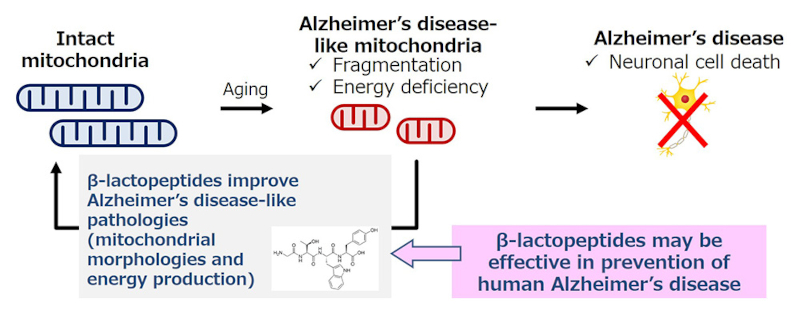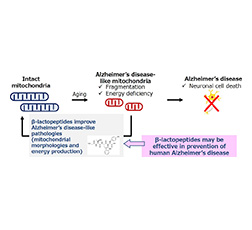[Health Science domain]
A world first! New Functions of Milk-derived β-lactopeptides Leading to Prevention and Improvement of Alzheimer's Disease
Confirmation of the efficacy of human iPS cell-derived neurons in improving mitochondrial function.
- CSV
- Research and Technology
September 7, 2022
Kirin Holdings Company, Limited
TOKYO, September 7, 2022 - Kirin Holdings Company, Limited’s (Kirin Holdings) Kirin Central Research Institute, has revealed for the first time in the world that GTWY peptide (hereafter β-lactopeptides)※1 , one of the β-lactopeptides derived from milk, has a novel function to improve mitochondrial function decline, a major pathological condition in Alzheimer's disease.※2 The results of this research were presented at the Alzheimer’s Association International Conference 2022, the world's largest conference on Alzheimer's disease, held from July 31 (Sunday) to August 4 (Thursday), 2022.
1 GTWY is a key component of β-lactopeptides and a tetrapeptide with a sequence of four amino acids called glycine-threonine-tryptophan-tyrosine.
2 One of the intracellular organelles that produces adenosine triphosphate (ATP), an energy substance essential for life.
Background to the research
As Japan's super-aged society, the number of dementia patients, including those with Alzheimer's disease, is on the rise and has become a major social issue. In recent years, it has become clear that a decline in the function of mitochondria, known as the energy-producing factories of cells, is one of the major pathological conditions of Alzheimer's disease, and maintaining or improving mitochondrial function is considered important for maintaining brain health. In addition, improvement of daily life, such as diet, is important to prevent dementia, and recent epidemiological studies have reported that consumption of milk and dairy products reduces the risk of dementia, attracting much attention.※3
As a result of our long-standing brain science research in collaboration with the University of Tokyo and Kyowa Kirin Company, Limited, we have discovered β-lactopeptides as milk-derived peptides, which are abundant in fermented dairy products such as Camembert cheese, and reported that it helps maintain cognitive function in humans.※4 They also reported that β-lactopeptides prevent Alzheimer's disease-like conditions in non-clinical studies※5
3 Ozawa M, et al, Journal of the American Geriatrics Society, 2014, 62(7): 1224-1230
4 Ano Y, Nakayama H, et al, Neurobiology of Aging, 2018, 72: 23-31
5 Ano Y, et al, Journal of Alzheimer's Disease, 2020;73(4):1331-1342
Outline of the research
To further elucidate the mechanism of β-lactopeptides on the pathophysiology of Alzheimer's disease, we focused our research on the decline of mitochondrial function in Alzheimer's disease. In this study, we examined the effect of β-lactopeptides using Alzheimer's disease model neurons derived from human iPS cells as an evaluation method similar to the human pathological condition. In Alzheimer's disease model neurons, pathological conditions such as abnormal mitochondrial morphology are induced by the accumulation of amyloid-β, a brain waste product that is considered one of the causative agents of Alzheimer's disease. For this Alzheimer's disease-like pathology, β-lactopeptides were found to improve mitochondrial morphology, energy production, and other functions. These results indicate that β-lactopeptides may prevent or suppress the pathophysiology of Alzheimer's disease by improving mitochondrial dysfunction in Alzheimer's disease (Figure). These results are expected to be applied to efforts to maintain brain health and improve cognitive function in the future.
-

Improvement of Alzheimer's disease-like pathology by improving mitochondrial function with β-lactopeptides.
Future development
The Kirin Group has formulated a long-term management concept, Kirin Group Vision 2027, and aims to "create value in areas ranging from food to medicine and become a global CSV※6 leader.
To achieve this goal, in addition to our existing businesses in the "food domain" (alcoholic beverages) and "medical domain" (pharmaceuticals), we are launching and nurturing a "health science domain" (health science business) that will contribute to people's health based on the advanced "fermentation and biotechnology" technologies that the Kirin Group has developed over the years. In the health science area, we have designated "immunity" and "brain function" as priority areas and are conducting various research and development activities. In the future, we will work with universities and local governments to realize a society in which "brain health" support is possible.
6 Creating Shared Value: combined added value for consumers as well as for society at large.
Kirin Brain Research
Japan has become a "super-aging society" where one in four people is elderly※7 and it is estimated that one in five of the elderly will suffer from dementia※8 by 2025. In addition, due to the recent rapid changes in the social environment, the promotion of brain and mental health has become a major social issue.
The Kirin Group is promoting "Kirin Brain Research" to protect brain and mental health through brain science research and to create new joys. Kirin Brain Research based on Kirin’s distinct technology and ways of thinking contributes to promote brain health in an effort to help resolve social issues and will create a society conducive to psychologically prosperous living, where everyone has confidence and ambition and feels free to experience their emotions.
7 Annual Report on the Aging Society, 2020
8 Grants-in-Aid for Scientific Research, MHLW Special Research Project. Research on Future Trends in the Prevalence of Dementia Among Elderly People in Japan. 2014 Report on General/Specialized Research, 2015.
The Kirin Group will contribute to the realization of a spiritually rich society by expanding new joys in "food and health" through manufacturing that focuses on nature and people.
| 1. Name of presentation: | "β-Lactolin Improves Mitochondrial Dysfunction in Aβ-treated Mouse Hippocampal Neuronal Cells and a Human iPSC-Derived Neuronal Cell Model of Alzheimer's Disease |
|---|---|
| 2. Name of academic meeting: | Alzheimer’s Association International Conference 2022 |
| 3. Place of presentation: | San Diego Convention Center (USA) |
| 4. Date of presentation: | Sunday, July 31 - Thursday, August 4, 2022 |
| 5. Presented by: | Tatsuhiro Ayabe, Chika Takahashi, Rena Ohya, Yasuhisa Ano, Kirin Central Research Laboratories, R&D Headquarters, Kirin Holdings Company, Limited |
About Kirin Holdings
Kirin Holdings Company, Limited is an international company that operates in the Food & Beverages domain (Food & Beverages businesses), Pharmaceuticals domain (Pharmaceuticals businesses), and Health Science domain (Health Science business), both in Japan and across the globe.
Kirin Holdings can trace its roots to Japan Brewery which was established in 1885. Japan Brewery became Kirin Brewery in 1907. Since then, the company expanded its business with fermentation and biotechnology as its core technologies, and entered the pharmaceutical business in the 1980s, all of which continue to be global growth centers. In 2007, Kirin Holdings was established as a pure holding company and is currently focusing on boosting its Health Science domain.
Under the Kirin Group Vision 2027 (KV 2027), a long-term management plan launched in 2019, the Kirin Group aims to become “A global leader in CSV, creating value across our world of Food & Beverages to Pharmaceuticals.” Going forward, the Kirin Group will continue to leverage its strengths to create both social and economic value through its businesses, with the aim of achieving sustainable growth in corporate value.
GALLERY
-

image
